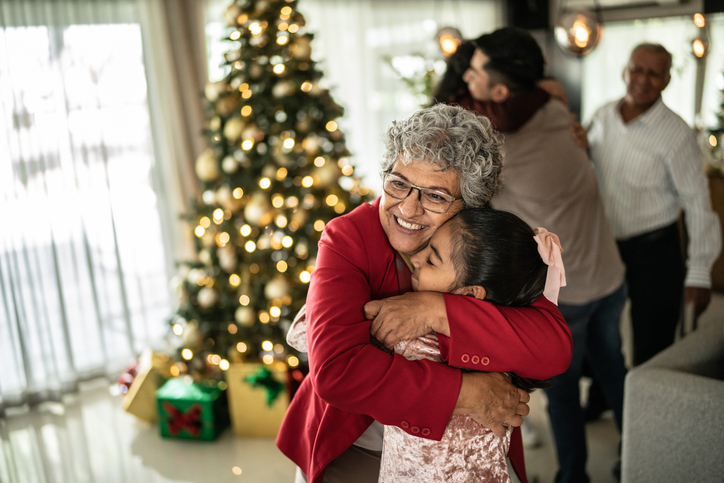Dementia and the Holidays: A Simple Guide for Families
The holidays can be fun, but they can also be hard—especially for families living with dementia. Here, Marsha Hasse, licensed social worker with Riverside Senior Life Communities, shares practical tips.
Dementia vs. Normal Aging: Understanding the Difference
Everyone forgets things sometimes as they age, but dementia is a distinct condition. “With dementia, we’re looking at someone who has some memory loss that disrupts their daily life,” Hasse explains. “In normal aging, you’re going to see more of forgetting names but remembering them later.”
She notes that people with dementia often struggle with familiar tasks or become confused about time and place. “Sometimes you also see confusion with time and place. Whereas with normal aging, you might say, ‘Oh, I don’t know what day of the week it is,’ but again, you can recall it later on.”
“Our brain is an organ that ages like the rest of our body,” she adds. “So, you’re going to see some of those changes as you get older.”
Why the Holidays Can Be Hard
“The holidays can be a tough time,” Hasse cautions. “They’re stressful. There’s a disruption of the person’s routine.”
She explains that the overstimulation of the season—decorations, noise, and visitors—can be overwhelming. The caregiver is still trying to balance their traditions, caring for their loved one, and making celebrations as joyful as possible. This brings about a significant increase in stress.
Sometimes, visiting family members may not realize how much the person’s condition has changed. “Family lives out of town, and now they come into town and think mom or dad is fine,” she shares. “The one who is here is still trying to do that day-to-day caregiving.”
What to Watch For
If you haven’t seen your loved one in some time, the holidays may highlight changes. Hasse suggests paying attention to whether your loved one struggles with activities they once did without effort, such as baking a favorite dish or keeping track of conversations. Withdrawal from social activities can also be a sign of overstimulation. If someone who usually enjoys family games or gatherings chooses to sit alone or move to a quieter space, they may be feeling overwhelmed.
“If you do see changes, you definitely want to consult with their primary care physician,” she advises. “You don’t want to be hyper-focused on things, because again, they’re getting older. But pay attention.”
Creating a Safe and Calm Environment
Safety should be a top priority during the holidays. Too many decorations, flashing lights, or cluttered spaces can be confusing. Or, even dangerous for someone with dementia. Simple, familiar decorations can create a festive atmosphere without overwhelming the senses. Loud background music or too many overlapping conversations can also increase anxiety.
“Having less noise—because that could increase anxiety or stress in your loved one—is important,” she urges. “If you’re eating dinner and you’ve got music on that’s loud, look at those things.”
Families should also be aware of wandering risks. This is especially true if visitors are coming and going. It helps to plan gatherings around the person’s best time of day. Many people with dementia feel more alert and calm in the morning or early afternoon.
Reducing Stress for Everyone
Keeping a familiar routine is one of the best ways to reduce stress. Hasse recommends maintaining regular nap times, meals, and medication schedules. Smaller gatherings can also make the season easier to manage. Timing is another consideration. A dinner might interact with sundown, which could present issues. A brunch may be a better decision.
It can also help to bring out old photo albums or play favorite music from years past. People with dementia often remember songs and moments from long ago. Familiar sights and sounds can help them feel more connected.
Caring for the Caregiver
Caregivers also need to protect their own health. “It is important for the caregiver to take the best care they can for themselves,” Hasse encourages. “Prioritize self-care by eating well, exercising, and getting enough sleep. Set realistic goals. Ask for help and accept help if people offer.” She also says it’s important to learn to say no. There is nothing wrong with doing so.
Support and Resources
Riverside Healthcare can provide additional support through primary care providers, neurology specialists, speech language pathologists, and occupational therapists. These providers can help identify signs of dementia, make a diagnosis, and manage symptoms through medication and recommended lifestyle changes. Medicare Annual Wellness Visits can also include cognitive screenings to help detect changes early.
Riverside Senior Life Communities offers a caregiver support group. It is in partnership with the Alzheimer’s Association. The group meets on the second Tuesday of every month at 5:00 p.m. at the Bourbonnais Grove Senior Living campus. It’s open to both Riverside residents and community members caring for loved ones at home.
For those who can’t attend in person, the Alzheimer’s Association provides online resources, education, and a 24/7 helpline for support at any time.
A Final Word
Hasse’s advice for families this holiday season is simple: “Take care of yourself, enjoy your loved one, and don’t let the diagnosis define them. They’re still the same person inside. Make the holidays about being together and creating calm, meaningful moments.”
To learn more about Riverside Senior Life Communities, visit RiversideSeniorLife.com, or find resources at riversidehealthcare.org.

